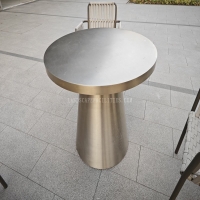Welcome to the website for landscape facilities products and knowledge.
How does the choice of material impact the overall sustainability of a landscape bar counter?
The selection of materials for a landscape bar counter extends far beyond mere aesthetics; it fundamentally determines the structure's environmental footprint and long-term sustainability. Designers and homeowners must consider several critical factors when choosing materials, as these decisions directly impact ecological responsibility, durability, and overall environmental impact.
Recycled and upcycled materials present particularly sustainable options for landscape bar counters. Recycled composite lumber, made from reclaimed plastic and wood fibers, offers exceptional durability while diverting waste from landfills. Similarly, reclaimed wood from barns, factories, or fallen trees provides character and history without requiring new tree harvesting. These materials reduce the demand for virgin resources and minimize the environmental damage associated with extraction and processing.
The source of materials significantly influences sustainability. Locally sourced stone or wood dramatically reduces transportation emissions compared to materials shipped internationally. Additionally, rapidly renewable materials like bamboo—which matures in just three to five years—provide excellent alternatives to traditional hardwoods that may take decades to regenerate. Certification systems like FSC (Forest Stewardship Council) for wood help ensure responsible forestry practices and sustainable sourcing.
Durability and lifespan constitute crucial sustainability considerations. Materials that withstand outdoor elements without frequent replacement ultimately reduce waste and resource consumption. Natural stone, while sometimes energy-intensive to quarry, may last for decades or even centuries with minimal maintenance. Powder-coated aluminum offers weather resistance and longevity without the need for chemical treatments required by some wood varieties.
Maintenance requirements also affect environmental impact. Materials that need regular chemical sealing or staining introduce toxins into the environment and require ongoing resource consumption. Conversely, naturally rot-resistant woods like cedar or redwood may need fewer chemical treatments, while stainless steel or concrete might require only occasional cleaning with environmentally friendly products.
The production process itself warrants examination. Some materials demand enormous energy inputs or generate significant pollution during manufacturing. Concrete production, for instance, accounts for approximately 8% of global CO2 emissions. By contrast, materials like recycled glass countertops or responsibly harvested timber typically have lower embodied energy—the total energy required throughout a product's lifecycle.
End-of-life considerations complete the sustainability picture. Choosing materials that can be recycled or biodegraded at the end of their useful life creates a circular economy rather than contributing to landfill waste. Modular designs that allow for easy disassembly and material separation further enhance recyclability and future adaptability.
Ultimately, the most sustainable landscape bar counter combines multiple thoughtful material selections: locally sourced, durable, low-maintenance options with high recycled content and excellent end-of-life prospects. This holistic approach to material selection ensures that your outdoor living space contributes positively to environmental stewardship rather than detracting from it.
Related search:

Recommendation
Outdoor Metal Table - Classic Outdoor Furniture, Stainless Steel Table, Durable and Reliable